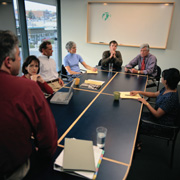
Facilitating Effective Meetings
Effective
Meetings
OK,
take a deep breath! We've almost completed our administrative primer.
The next two areas, effective meetings and stress
management, are also essential ingredients of your success. After
all, once you have built your team, you need to hold efficient, effective
meetings.
 |
A friend of mine who was an administrator at a community college in California had this sign displayed on his door: “Meetings, the illogical alternative to work.” Guess you can probably figure out how he felt about meetings. Honestly, most of us have the same attitude. We tend to look at meetings as a necessary evil. We have the stereotypical attitude of meetings as the number one contributor to inefficient use of time. However, when we attend a meeting that is well-run, has an agenda, and closes with action items, we feel that our investment of time is worthwhile. |
The next
few paragraphs will teach you how to run an effective meeting and yield
the results you seek.
CG & A Communications lists in its internal company newsletter these
five rules for facilitating an effective meeting:
- Have an agenda, circulate it prior to the meeting, and then stick to it!
- Prepare yourself - know the issues and the meeting’s participants.
- Prepare others - announce your expectations at the beginning of the meeting and ensure any support materials are circulated.
- If you chair the meeting - start and finish on time and engage all participants. If you’re a participant, support the facilitator in his or her effort to run the meeting.
- Conclude with any action items you need to follow-through on - and complete all follow-through items as efficiently as possible.
That’s a pretty good quick list of things to keep in mind. Here is another “quick hit” list of ways to run an effective meeting from executive coach Jan Gordon. This list can be found online at www.businesspotential.com/effect_meet.htm.
-
Communicate the objective for the meeting. Make sure that everyone understands the purpose of the meeting and has a clear sense what outcome needs to be achieved by the meeting’s end.
-
Don’t waste air time. Communicate succinctly and communicate only if it moves the conversation and group closer to the intended outcome.
-
Don’t use air time to vent without offering constructive solutions.
-
Respect people’s time. Always have an agenda with a time-frame, and stick to the schedule.
-
Do meeting preparation and/or research in advance so that the people resource is efficiently used during the meeting.
-
Forward the motion, forward the motion, forward the motion! Do this while allowing opportunity for purposeful discussion.
-
Identify a time-keeper who has the responsibility for keeping the facilitator/leader on track and accountable to the content and time-frame of the prepared agenda.
-
Be realistic about what you can accomplish during a meeting. Think through the best ways of carrying out a project so that participants are able to make worthwhile contributions without excessive time commitments.
-
Recognize that differences of opinion sometimes produce the most powerful results when common ground is found. We learn more from those who disagree with us than from those who agree.
-
Express appreciation for peoples’ time, energy, and contributions if you want continued involvement. Set a tone of respect for each other.
Knowing there is so much information, both in-print and online, concerning effective meetings, I elected to give you just a few basic tenets you should apply to each meeting you facilitate rather than launch into a long-winded explanation regarding the entire meeting process from beginning to end. The last area I want to cover with you is different meeting methods. These types come from the Institute of Cultural Affairs (ICA):
-
Discussion Method - Takes the group through stages of learning: objective, reflective, interpretive, and decisional. Use this method to reflect on experiences or events, evaluate and discuss tough issues, collect ideas, and give out information.
-
Workshop Method - Generates team consensus, creativity, and responsibility. Use to brainstorm, organize and name ideas, activities, and priorities. Works for consensus building in a diverse group.
-
Action Planning - Effective for launching a new project or activity. Use to clarify direction, align resources, designate leadership roles and responsibilities, and build team trust and support.
-
Force Field Analysis - Builds momentum for reaching a goal. Helps avoid working on unattainable goals. Use to identify forces that maintain the status quo, push toward change, and resist change. Works best with a group of twenty or fewer.
In summary, you can avoid holding the type of meetings everyone dreads through a bit of simple planning before the meeting, effective facilitation during the meeting, and follow-up at the end of the meeting.